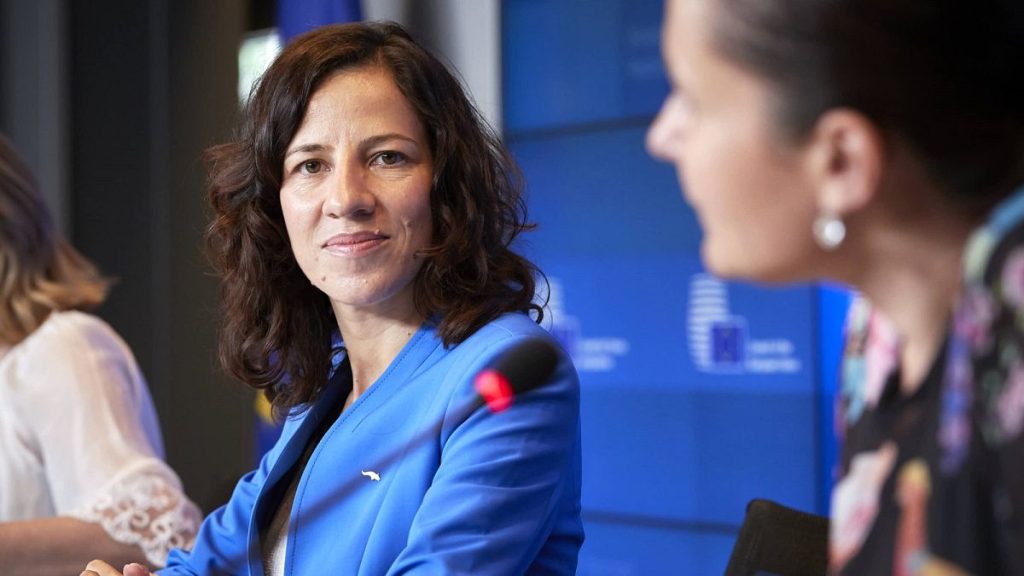Romania changed its choice for Commissioner in response to calls by von der Leyen for gender parity in the next cabinet. Bucharest is vying for an economic portfolio and has nominated a former minister for EU funds and secretary of state for public procurement, newly-elected MEP Roxana Mînzatu. The growth towards far-right nationalism is leading to a reversal in gender equality and the fight against gender-based violence, Romania’s pick for EU Commissioner has told Euronews. Mînzatu is a former minister for European funds and secretary of state with a focus on public procurement. Romanian Prime Minister Marcel Ciolacu initially chose Social Democrat MEP Victor Negrescu but acceded to the policy suggested by President von der Leyen. Bucharest is hopeful the move will improve the country’s chances of receiving a more influential cabinet portfolio. Von der Leyen requested member states to send the names of a woman and a man for her to arrange her cabinet based on experience and capability, while prioritising overall gender balance. So far, only around a third of countries have obliged to send a woman for the next Commission.
From the outgoing Commission, out of 27, there are 12 women commissioners. Mînzatu says such policies are necessary as gender equality isn’t happening ‘organically’. Moreover, she fears the current febrile atmosphere gripping politics in Europe – particularly coinciding with the rise of far-right parties is leading to a reversal of women’s rights. The recent European Parliament Elections saw a drop in the rise of women elected for the first time in 45 years. Although the drop was small – just 1% – it was the first time the trend went downwards. Her analysis is reflected in the correlation between far-right parties and fewer women getting elected to the European Parliament. The Greens/EFA group will have parity, with 50.9% female MEPs within its ranks. The Left and centrist Renew come next at around 45%, while just over a fifth (21.7%) of MEPs from the hard-right European Conservatives and Reformists Group (ECR) will be female. “I’ve often explained that the lack of women in public authority positions is directly related, in my opinion, with gender-based violence because it’s a mentality and a bias that exists, that women are vulnerable, that they are victims, and this is enhanced by the fact that authority positions are male almost all the time.”
President of the Commission Ursula von der Leyen is due to announce cabinet posts on 11 September. Each nominee will then be scrutinised by MEPs in the relevant committees in the European Parliament, and then voted on by all MEPs. Romania’s gender parity decision for the EU Commissioner post aligns with von der Leyen’s aim to have a gender-balanced cabinet. Mînzatu believes that gender equality is vital in addressing gender-based violence and promoting women’s rights. The rise of far-right parties has been linked to a decrease in the number of women elected to the European Parliament, indicating a need for policies to ensure equal representation. By choosing Mînzatu, Romania aims to increase its chances of securing a prominent cabinet portfolio.
Mînzatu emphasizes the importance of having competent female candidates in decision-making roles to challenge existing biases and promote gender equality. She highlights the correlation between the lack of women in public authority positions and gender-based violence, stressing the need for a diverse leadership that includes both men and women. The current political climate in Europe, marked by the rise of far-right parties, poses a threat to women’s rights and gender equality, making initiatives like gender parity in the EU Commission crucial. The upcoming announcement of cabinet posts by von der Leyen will be a significant moment in determining the future composition of the EU Commission and its commitment to gender balance and representation.
The decision by Romania to nominate Roxana Mînzatu as its candidate for EU Commissioner reflects a broader trend towards addressing gender disparities in political representation. By prioritizing gender parity in the Commission, President von der Leyen signals a commitment to promoting diversity and inclusion in the EU’s highest decision-making body. Mînzatu’s background in European funds and public procurement positions her as a capable candidate for an economic portfolio within the Commission. As the EU seeks to navigate global competition and industrialization, having competent and experienced female leaders like Mînzatu can help drive strategic initiatives and support small and medium-sized enterprises. The scrutiny and voting process for Commission nominees in the European Parliament will further determine the composition of von der Leyen’s cabinet and the extent to which gender balance is achieved.













